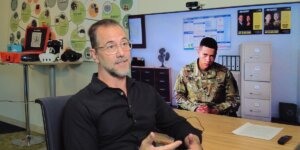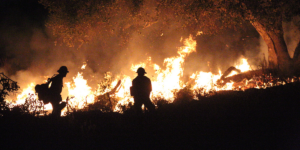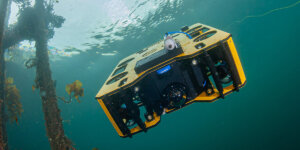At least 70 million people around the world don’t have the luxury of social distancing, self-isolation or the means to practice proper hygiene. They represent the world’s displaced people living in crowded informal settlements and makeshift shelters susceptible to disease and the rapid spread of viruses.
One of these settlements, at the borders of Europe, is Moria Reception and Identification Center – home to more than 20,000 refugees awaiting asylum on the Greek island of Lesvos in a space built for 3,000. In February 2020, before USC suspended all student travel, students enrolled in Innovation In Engineering and Design For Global Crises, a novel USC Viterbi course open to all majors, traveled to Camp Moria to test the innovative products they had designed over the last six months. Student teams received $6,000 each to invest in their prototypes and two sponsored trips to refugee camps to conduct user research and on-the-ground testing of their products.
The two-semester interdisciplinary course, housed in the Sonny Astani Department of Civil and Environmental Engineering, has attracted students from seven different USC schools and 24 majors since first opening for enrollment in August 2018. On May 8, 2020, students in the second cohort presented their ideas at a Virtual Demo Day event attended by more than 150 industry experts, leaders of international aid organizations, peers, parents, global partners and faculty advisors.
One project that originated in the first cohort, Safar, has recently become the world’s first site-specific mobile app that bridges the informational gap between refugees and aid organizations. The student entrepreneurs behind Safar are in the process of officially launching the app in Camp Moria in partnership with several major organizations, including United Nations High Commissioner for Refugees (UNHCR).
This effort to bring engineering innovation to “the greatest humanitarian crisis since War World II” has been generously supported by Dean Yannis C. Yortsos; the USC Provost’s Office through its Wicked Problems Practicum; Sonny Astani (M.S. ISE ’78); Bryan Min (B.S. ISE ’86); Murat Sehidoglu (M.S. ISE, M.B.A. ’80); Walter H. Singer (B.S. CE ’82); Albert Dorman (M.S. CE ’62); Greater Kansas City Foundation and United Engineering Foundation.
One of the course’s main tenets is to train students to remain adaptable to an ever-changing, overlapping crisis landscape and to “pivot don’t quit” written in the course manifesto. As their ideas matured into prototypes, all of the student teams adapted their ideas to also address COVID-19. The course’s next challenge for the Fall 2020 cohort is to bring the same level of passion, dedication and ingenuity to bear upon the unfolding pandemic. Here are the products developed by students in the 2019-2020 cohort in one minute or less:
Duet
Duet is a nonprofit tech company that aims to change the way people give and to reimagine philanthropy for the 21st Century. Now in its first year since launching as a non-profit, Duet has returned to the course to continue developing the world’s first microphilanthropy platform that connects donors to both vulnerable populations and the impacted communities around them in a more meaningful, efficient and personal way. Currently focused in Greece, Duet started its first pilot project in Los Angeles in May 2020, where they are partnering with struggling local restaurants to deliver food to foster youth during the COVID-19 pandemic.
Key
Key is an educational application geared toward displaced teenagers. Key teaches life skills that provide young refugees the opportunity to create economic value for themselves and their surrounding communities. Key delivers content through curated video playlists on select topics translated in the user’s native language. Once learners complete lessons, Key delivers a starter kit that allows them to further learn by doing. The team’s long-term vision is to foster a supportive community of empowered learners. During its pilot test, Key delivered health and safety educational content to teenagers living in makeshift shelters.
Huddl
Huddl is a virtual mental healthcare platform for volunteers and aid workers in crisis zones. Team Huddl is working to alleviate the consequences of anxiety, depression and burnout by providing tele-counseling sessions with licensed mental healthcare professionals pro bono. The students have started pilot programs in Greece and in Southern California to support health workers on the frontlines of the pandemic.
Torch
Torch has designed a low-cost, ultra-adaptable solution to the problem of warmth and ventilation in makeshift refugee and homeless shelters. Their modular low-cost tiles can be added to the exterior of tents to better manage both temperature and humidity in hot and cold environments. In addition to their work in Camp Moria, they are partnering with Los Angeles organizations to deliver 500 torches to the city’s homeless population by the end of summer 2020.
Catalyst
Catalyst is an emergency response communications solution utilizing the latest GPS and drone mapping technology and creating instant alignment across response organizations in a dynamic crisis. Catalyst quickly communicates disaster location upon outbreak (fires, earthquakes and floods) and access info to first responders and the public in a clear, visually driven way saving critical seconds in an emergency. Having recently been selected to participate in the National Academy of Engineering’s COVID-19 Call for Action, Catalyst is currently exploring solutions such as mapping virus outbreaks and live contact tracing to better inform city, state and federal decision makers in a response.
Frontida
Frontida Records seeks to become Greece’s first free electronic health record system for refugees. With more than a million refugees having crossed Greece’s borders into Europe since 2015, no such system exists in the nation’s informal settlements and camps. Without access to patient’s illnesses and medications, health providers in refugee camps struggle to provide basic healthcare. Frontida solves this in two ways: by creating a provider portal tailored to physicians working in refugee camps; and launching a mobile patient portal to allow refugees to carry their medical records everywhere they travel. This system is especially needed in this unprecedented time since the documentation of communicable diseases like COVID-19 in informal settlements where social distancing measures are extremely difficult to enforce.
Published on May 28th, 2020
Last updated on May 19th, 2023













